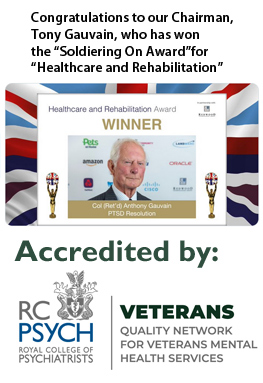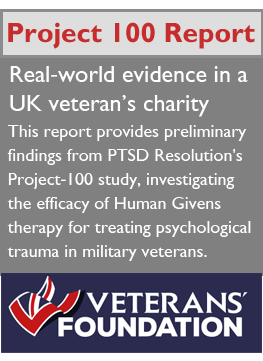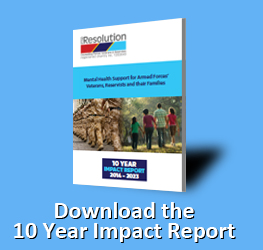Credentials & Complaints

Complaints to do with our referral process and therapy If any member of the public or the Institute has a complaint, concern or grievance, they should notify PTSD Resolution complaints@ptsdresolution.org All professional members of the HGI are subject to the Institute's Complaints Procedure. Any complaint will be considered and assessed by by the HGI Registration and Complaints Committee (RPSC). The complainant and the HGI member concerned will be informed of the progress of the complaint and of the outcome. If you wish to raise a complaint or register a concern about the service, practice or behaviour of the Human Givens Institute itself (as opposed to an individual Human Givens therapist), please notify the External Oversight Committee for Human Givens Therapy (EOCHGT), which oversees the activities of the HGI, supporting the good governance of the organisation. Please see the HGI web site for details
The Armed Forces Covenant is a commitment by public & private sector organisations to support those who serve or have served in the armed forces. The Covenant is a key part of every Company’s CSR (Corporate & Social Responsibility) programme.
Resolution therapists are trained in a form of Trauma-Focused Cognitive Behavioural Therapy (TFCBT), consistent with the guidelines of the National Institute for Health and Clinical Excellence (NICE). All 200 therapists in the the PTSD Resolution network are Human Givens Institute (HGI) qualified. Only HGI qualified therapists may join the network. This ensures a consistent, proven approach and governance structure to the therapy that we deliver to help Forces' Veterans and their families The Human Givens Institute Statement https://www.humangivens.com/human-givens/applications/ https://www.humangivens.com/human-givens/about/20-years/ https://www.humangivens.com/case-studies/ptsd-resolution/ https://www.humangivens.com/research/kings-college-evaluation-of-client-outcome-data/ https://www.humangivens.com/human-givens/human-givens-therapy/hg-approach-difference/ The register of the HGI has been accredited under the Professional Standards Authority (PSA) for Health and Social Care in the UK, under its Accredited Registers Programme. Accreditation means that the HGI has met the Authority’s standards in the following areas: governance, setting standards, education and training, managing the register, providing information and dealing with complaints. As such, the programme offers enhanced consumer protection to anyone looking for health and social care services in general and Human Givens therapy in particular. |
Evidence Paper on the Evaluation of the above. ( Link to Occupational Medicine May23rd 2019) Evidence: "A Service Evaluation of PTSD Resolution Client Outcome Data", Burdett & Greenberg 2016”. Research Paper by The King’s Centre 27/09/2016: The King’s Centre for Military Mental Health Research has recently completed a service evaluation of PTSD Resolution client outcome data. (www.ptsdresolution.org) Professor Neil Greenberg and Dr Howard Burdett compared therapy outcomes in 504 PTSD Resolution clients with data from the NHS Improving Access to Psychological Therapies (IAPT) programme. Differences in definitions, measures and recording methods make direct comparisons with the IAPT service difficult, but a number of preliminary conclusions from the report appear encouraging. The report was clear that, as the service evaluation was not comparative and was not able to account for unmeasured factors which might account for change scores, the results should be treated with caution. However, with these caveats in mind, comparing the PTSD Resolution data with the IAPT data:-
These results are only preliminary and the next step will be to carry out a formal comparative trial to investigate the true origin of the reported improvements in patients’ health. However, at first sight there appears to be encouraging signs that PTSD Resolution is doing well by its 1392 clients to date, appearing to achieve similar outcomes to the national IAPT services. Also, it appears that the drop-out rate for Resolution clients is thankfully lower than for IAPT and the intervention appears to be as useful for distressed patients as those who are less symptomatic. The next phase of research will be considerably more expensive than this simple service evaluation – we will now be seeking funding for a study that could yield important new insights into the therapy of distressed veterans, including those with post-traumatic symptoms. For further information contact PTSD Resolution direct. Please also see: PTSD Resolution Key Facts |




